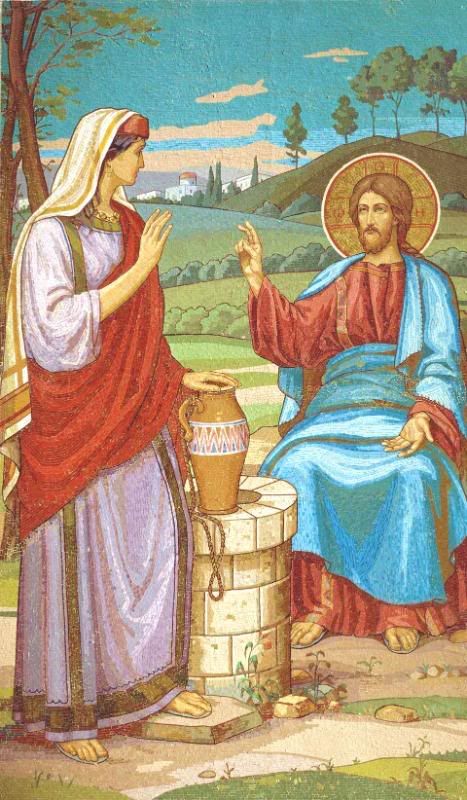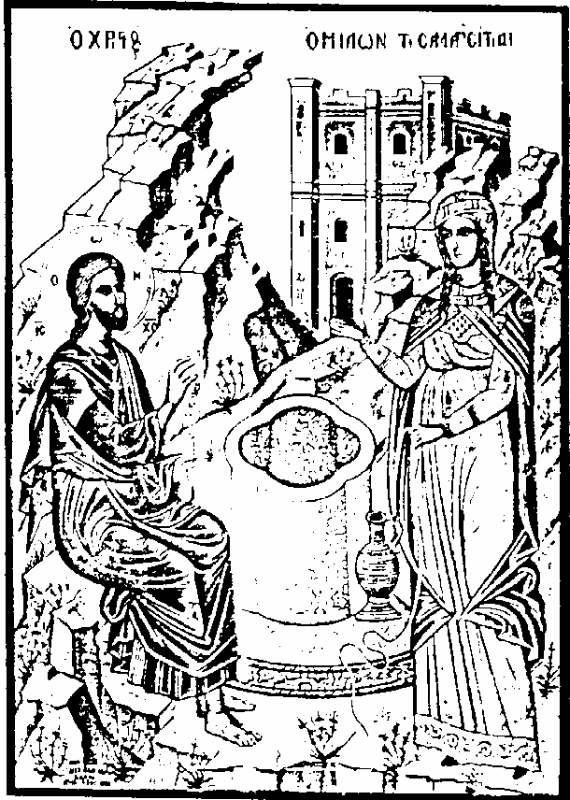On March 20, we commemorate the feast day of Saint Photina (also known as Svetlana, born unknown, died 66), holy martyr of the Church, better known as the Samarian woman Jesus encounters at Jacob’s Well:
5So he came to a town in Samaria called Sychar, near the plot of ground Jacob had given to his son Joseph. 6Jacob's well was there, and Jesus, tired as he was from the journey, sat down by the well. It was about the sixth hour.
7When a Samaritan woman came to draw water, Jesus said to her, "Will you give me a drink?" 8(His disciples had gone into the town to buy food.)
9The Samaritan woman said to him, "You are a Jew and I am a Samaritan woman. How can you ask me for a drink?" (For Jews do not associate with Samaritans.)
10Jesus answered her, "If you knew the gift of God and who it is that asks you for a drink, you would have asked him and he would have given you living water."
11"Sir," the woman said, "you have nothing to draw with and the well is deep. Where can you get this living water? 12Are you greater than our father Jacob, who gave us the well and drank from it himself, as did also his sons and his flocks and herds?"
13Jesus answered, "Everyone who drinks this water will be thirsty again, 14but whoever drinks the water I give him will never thirst. Indeed, the water I give him will become in him a spring of water welling up to eternal life."
15The woman said to him, "Sir, give me this water so that I won't get thirsty and have to keep coming here to draw water."
16He told her, "Go, call your husband and come back."
17"I have no husband," she replied.
Jesus said to her, "You are right when you say you have no husband. 18The fact is, you have had five husbands, and the man you now have is not your husband. What you have just said is quite true."
19"Sir," the woman said, "I can see that you are a prophet. 20Our fathers worshiped on this mountain, but you Jews claim that the place where we must worship is in Jerusalem."
21Jesus declared, "Believe me, woman, a time is coming when you will worship the Father neither on this mountain nor in Jerusalem. 22You Samaritans worship what you do not know; we worship what we do know, for salvation is from the Jews. 23Yet a time is coming and has now come when the true worshipers will worship the Father in spirit and truth, for they are the kind of worshipers the Father seeks. 24God is spirit, and his worshipers must worship in spirit and in truth."
25The woman said, "I know that Messiah" (called Christ) "is coming. When he comes, he will explain everything to us."
26Then Jesus declared, "I who speak to you am he." (Luke 4: 5-26)
Following these events, we know that Photina returned to her village, and many came to believe in Jesus through her testimony. The life of Photina following her encounter with the Lord is one of great love for Him, constant preaching despite fear of persecution, and eventual horrible torture and death. She is highly venerated in the Eastern and Orthodox traditions, and recognized in the Roman Catholic martyrology.
Following her encounter with the living Christ, Photina and her son apparently lived in Carthage, where they preached the Gospel to all who would listen. Her eldest son, Saint Victor, a soldier, had demonstrated his bravery in battle, and was therefore rewarded with a prominent station in the city of Attalia. Following a conversation with the city’s administrator, during which Victor was encouraged to renounce his faith and warn his mother and sisters not to preach the Gospel, the city administrator was struck dumb and blind for three days. Upon recovering his senses, and seeing Victor still with him, the administrator converted to Christianity, along with his servants. News of this miraculous conversion eventually reached Emperor Nero, an active and sadistic persecutor of Christians, who ordered the m brought to Rome for trial.
Hearing of the trial, Saint Photina, her sisters, and several other believers, traveled to Rome to join the confessors in their time of trial. The trial was short, and torture began almost immediately upon the accused refusing to renounce their belief in Christ. Each of the martyrs had their wrists crushed in an anvil, but reported feeling no pain. Photina’s wrist, however, was miraculously unable to be crushed. The men were thrown into prison, where they continued to preach to all who would listen, the prison itself transforming into a place that was glowing with light and sweet in odor. The women were confined to the service of the Emperor’s daughter, who promptly converted to the faith through their witness, as did her servants.
Incensed with rage, Nero ordered the martyrs executed. The men were crucified upside down and beaten for three days, still refusing to die. They then had their legs severed below the knees, their limbs thrown to dogs, and were beaten until the expired. The women were mutilated, tied to two bent trees, and upon their release were split in half. Saint Photina was thrown down a well, fittingly, the place she had first encountered the Lord. After 20 days of freezing water, no food, or sleep, she was called before the emperor. Again, she was asked to renounce her faith, but replied, “Most impious, blind, lost mad man! Can you possibly think me so stupid that I would agree to renounce my Lord Christ and offer sacrifice to idols as blind as you?!” Without hesitation, Nero had her thrown back into the well, where she died at peace with the Lord.
We read throughout the New Testament about the life of Jesus, and the individuals he encounters during his ministry—the blind man who has his sight restored, countless individuals cured of leprosy, possession, and illness, those He dines with, those He teaches, those He challenges. Like the woman at the well, these are the first Christians, those who risked life and limb in the propagation (and promulgation!) of the early faith. Yet, we rarely pause to consider what their lives were like, following their encounters with Christ, recorded in the Gospels. Photina's martyrdom, recorded in history, offers us a glimpse into the lives of these early Christians.
Photina, so moved by the Lord, so thirsty for the water of life, gave all she had to spread the Gospel to others. So loving and charitable was she, she chose to give her life so that others might hear the words of Christ and come to believe. It is certainly a challenge in our lives to live our faith openly, witnessing to those we encounter—not because of threat of death in most cases, but because of the judgment and hostility exhibited by many in the world. The question is, should we let that stop us? The love of Christ compels us to call others to Him, so that they too may be saved. How, through our lives, words, and behaviors, are we serving as witnesses to the glory and redemption of Jesus Christ? We pray that we may courageously live our faith, so that all may see and believe!
By the well of Jacob, O holy one,
thou didst find the Water of eternal and blessed life;
and having partaken thereof, O wise Photina,
thou went forth proclaiming Christ, the Anointed One.
Help us to follow your example,
and through our lives bring glory to the Lord and believers to the Church.
Amen.






No comments:
Post a Comment
Thanks for leaving a comment. If you wish to submit a prayer request, however, please do so above, using the "Contact" tab.